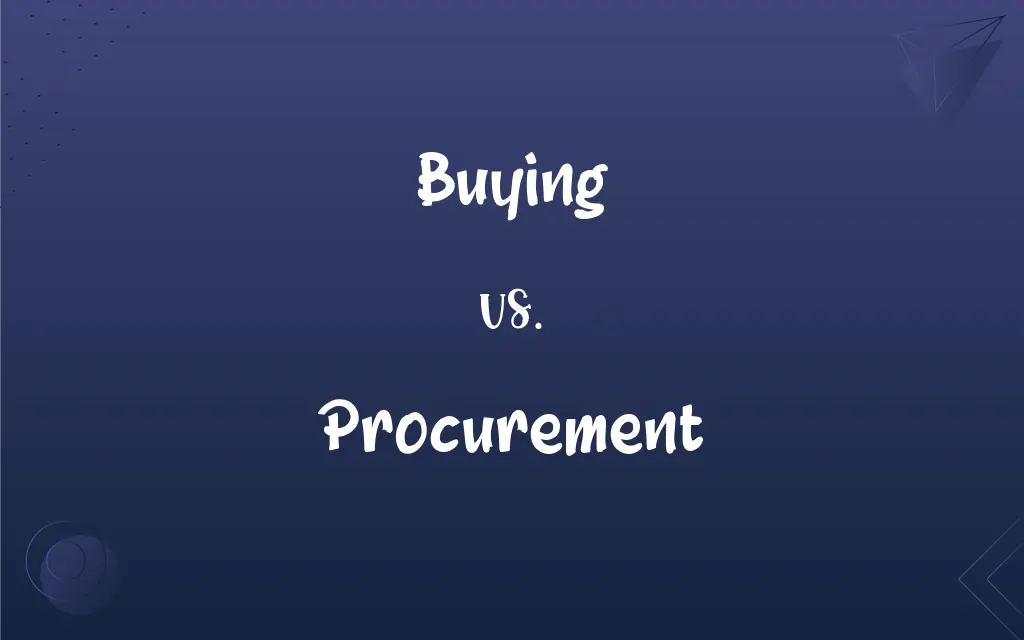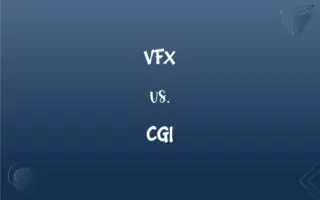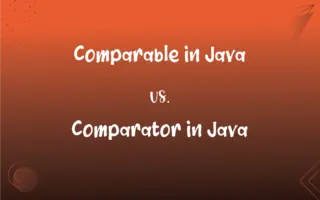Buying vs. Procurement: What's the Difference?
Edited by Aimie Carlson || By Janet White || Published on February 13, 2024
Buying is the act of acquiring goods or services in exchange for money. Procurement is a strategic process involving sourcing, acquiring, and managing resources for organizational needs.

Key Differences
Buying is a simple transaction where goods or services are exchanged for money, focusing on the act of purchase itself. Procurement, however, encompasses a broader spectrum, involving the strategic process of sourcing and acquiring goods or services for an organization's specific needs.
Buying often implies a straightforward, one-time transaction with immediate exchange, such as purchasing supplies from a store. In contrast, procurement involves steps like identifying needs, selecting suppliers, negotiating terms, and managing supply contracts, making it a more complex and strategic function.
Buying can be a part of everyday personal or business activities without much planning, while procurement is usually a planned, methodical process undertaken by organizations to fulfill long-term goals. It includes aspects like quality assurance, cost-effectiveness, and supplier relationships.
Buying is generally a reactive process, addressing immediate needs or desires. Procurement, on the other hand, is proactive, involving researching, planning, and strategically acquiring resources necessary for organizational objectives.
Buying focuses on the transaction itself, primarily concerned with price and immediate availability. Procurement goes beyond this to consider factors like the total cost of ownership, value for money, and alignment with organizational policies and goals.
ADVERTISEMENT
Comparison Chart
Focus
Immediate transaction
Strategic process
Scope
Individual transactions
Sourcing, acquiring, managing resources
Planning
Often spontaneous
Methodical and planned
Objective
Fulfill immediate need
Fulfill strategic organizational needs
Considerations
Price, availability
Total cost of ownership, value, supplier relationships
ADVERTISEMENT
Buying and Procurement Definitions
Buying
Making a purchase of goods or services.
Buying a new car can be exciting.
Procurement
Obtaining goods or services through careful planning and negotiation.
Procurement of quality materials is essential for product development.
Buying
Exchanging money for goods or services.
Buying groceries online is convenient.
Procurement
The strategic process of acquiring resources for organizational needs.
The company's procurement of new software was a lengthy process.
Buying
The act of obtaining ownership through payment.
He is buying a new house this year.
Procurement
Coordinating the acquisition of goods and services for strategic goals.
The procurement team is responsible for supplier relations.
Buying
Engaging in a transaction to acquire something.
They are buying tickets for the concert tonight.
Procurement
The act of sourcing and managing supplies for a business.
Effective procurement strategies can reduce overall costs.
Buying
Acquiring something in exchange for money.
She enjoyed buying fresh produce from the local market.
Procurement
Organizational process of acquiring resources efficiently and ethically.
Sustainable procurement is a priority for our company.
Buying
To acquire in exchange for money or its equivalent; purchase. See Note at boughten.
Procurement
To get by special effort; obtain or acquire
Managed to procure a pass.
Buying
To be capable of purchasing
"Certainly there are lots of things in life that money won't buy" (Ogden Nash).
FAQs
Is buying always part of procurement?
Buying is a component of procurement, but procurement involves additional strategic elements.
Is buying typically for personal use?
Buying can be for personal or business use but is usually a simpler transaction.
Does procurement always involve negotiation?
Negotiation is often a key part of the procurement process.
Can buying be part of an organization's procurement process?
Yes, buying can be a step within the broader procurement process.
Does procurement include supplier management?
Yes, managing supplier relationships is an important part of procurement.
Can buying involve long-term planning?
Buying is usually more immediate and less planned compared to procurement.
Can individuals engage in procurement?
Procurement is typically a business or organizational activity.
Is buying only concerned with price?
While price is a key factor in buying, other aspects like quality can also be considered.
Can procurement include services as well as goods?
Yes, procurement encompasses both goods and services.
Is procurement only for large organizations?
While more common in larger organizations, any business can engage in procurement.
Does procurement require specialized knowledge?
Yes, procurement often requires expertise in negotiation, market analysis, and supplier management.
Does buying focus on immediate needs?
Yes, buying is often focused on immediate or short-term needs.
Can procurement impact an organization's overall strategy?
Yes, procurement can significantly impact organizational strategy and performance.
Is buying a strategic process?
Buying is generally not considered as strategic as procurement.
Is buying limited to physical goods?
No, buying can include services as well.
Does procurement aim at cost savings?
Cost savings, along with value and efficiency, are central goals of procurement.
Can buying decisions be part of procurement strategy?
Yes, individual buying decisions can align with and support a broader procurement strategy.
Is procurement a one-time event?
No, procurement is an ongoing process.
Does procurement involve research?
Yes, research is a key component of the procurement process.
Can buying be impulsive?
Yes, buying can sometimes be impulsive or spontaneous.
About Author
Written by
Janet WhiteJanet White has been an esteemed writer and blogger for Difference Wiki. Holding a Master's degree in Science and Medical Journalism from the prestigious Boston University, she has consistently demonstrated her expertise and passion for her field. When she's not immersed in her work, Janet relishes her time exercising, delving into a good book, and cherishing moments with friends and family.
Edited by
Aimie CarlsonAimie Carlson, holding a master's degree in English literature, is a fervent English language enthusiast. She lends her writing talents to Difference Wiki, a prominent website that specializes in comparisons, offering readers insightful analyses that both captivate and inform.






































































